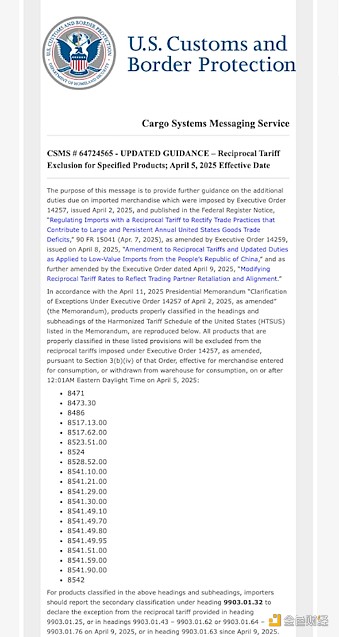
Author: Vince Quill, CoinTelegraph; Translated by: Deng Tong, Golden Finance
U.S. President Donald Trump has excluded a range of technology products, including smartphones, chips, computers and some electronic products from reciprocal tariffs, which has brought much needed trade pressure relief to the technology industry.
According to the U.S. Customs and Border Protection, memory cards, modems, diodes, semiconductors and other electronics are also excluded from “reciprocal” trade tariffs.
Kobessi wrote in an April 12 X post: "Eventually, large tech companies will stand out."
U.S. Customs and Border Protection announced exemption from tariffs on some tech products. Source: U.S. Customs and Border Protection
Tariff relief will ease pressure on technology stocks, one of the biggest victims of the trade war. The cryptocurrency market is closely related to tech stocks, and as the positive news of the trade war triggers a rise in risk appetite, the cryptocurrency market may also rise.
After news of tariff exemptions came out, the price of Bitcoin exceeded $85,000 on April 12, indicating that the cryptocurrency market has begun to respond to the latest macroeconomic developments.
In a period of macroeconomic uncertainty, the market was full of doubts about Trump's words and deeds. On April 9, President Trump announced the suspension of 90-day reciprocity tariffs on US goods and reduced the tariff rate for which no counter-tariffs on US goods to 10%, thus recovering the previous comprehensive tariffs.Bitcoin soared 9% on the same day Trump announced the suspension of tariffs, and the S&P 500 index soared more than 10%.
Macroeconomic trader Raoul Pal said tariffs are a negotiating tool for reaching a Sino-US trade agreement and described U.S. trade rhetoric as a "stance."
Bitcoin advocate Max Keiser believes that exemption of import tariffs on some technology products will not reduce bond yields, nor will it further achieve Trump's goal of lowering interest rates.
After the introduction of Trump's comprehensive trade, the yield on 10-year U.S. Treasury bonds soared. Source: TradingView
On April 11, the 10-year U.S. Treasury yield soared to a local high of about 4.5% as bond investors responded to macroeconomic uncertainty brought about by the protracted trade war.
Kaiser wrote on April 12: "The offer just given to technology exports will not reverse the trend of rising interest rates. Confidence in U.S. bonds and the dollar has been declining for years, and this trend will not stop."













